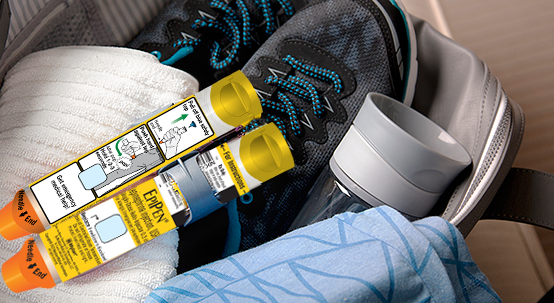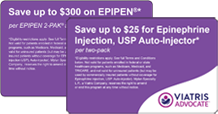
Do you know the signs and symptoms of anaphylaxis?
Anaphylaxis (an-a-fi-lax-is) is the medical term for a potentially life-threatening allergic reaction. It can occur within minutes after exposure to an allergen. That’s why it’s important to know what symptoms to look for:
Mouth
- Itching
- Swelling of lips and/or tongue
Lungs
- Shortness of breath
- Coughing
- Wheezing
Heart
- Weak pulse
- Dizziness
- Passing out
- Shock

Skin
- Itching
- Hives
- Redness
- Swelling
Throat
- Itching
- Tightness/closure
- Coughing

Stomach
- Vomiting
- Nausea
- Diarrhea
- Cramps
Why is it important to know these signs and symptoms?
Anaphylaxis is unpredictable—a mild allergic reaction one time can be life-threatening or severe the next. For example, someone who has a peanut allergy may accidentally eat a peanut and feel tingling lips and watery eyes that eventually go away. However, if the same person is accidentally exposed to a peanut on a different occasion, it could cause difficulty breathing, weak pulse, shortness of breath, fainting and hives that may quickly become life-threatening. Both are instances of anaphylaxis, but the severity, progression, symptoms and duration of the symptoms are inconsistent and unpredictable.
Is shock (sometimes called anaphylactic shock) a symptom of anaphylaxis?
Shock is just one of the many possible symptoms of anaphylaxis. It occurs when there is inadequate blood flow to critical organs of the body during anaphylaxis. However, shock may not be one of the symptoms a person experiences during anaphylaxis. More than half of all patients in a 10-year study showed no signs of shock during anaphylaxis. That’s why the term anaphylaxis is not interchangeable with the term anaphylactic shock—the first term encompasses all possible symptoms of a life-threatening allergic reaction.
Vigilance is essential
Because of this unpredictability, it’s crucial for parents and caregivers of children living with potentially life-threatening, or severe, allergies—as well as adults with severe allergies—to be vigilant about any type of allergic reaction ranging from mild to severe. Talk to a healthcare professional about how to identify the signs and symptoms of a life-threatening allergic emergency (anaphylaxis).
When to use EPIPEN® (epinephrine injection, USP) or EPIPEN JR® (epinephrine injection, USP) Auto-Injector (or the authorized generics)
The drug in EPIPEN and EPIPEN JR Auto-Injectors (and their authorized generics) is epinephrine. It’s important to administer epinephrine at the first signs of anaphylaxis.
According to national food allergy guidelines, epinephrine is the first-line treatment for life-threatening allergic reactions. A delay in administering epinephrine can be life-threatening.
If you, your child or someone you're caring for shows signs or symptoms of a life-threatening allergic reaction, administer EPIPEN or EPIPEN JR Auto-Injector immediately as prescribed and seek emergency medical care.
Explore
Explore the latest savings offers for EPIPEN (epinephrine injection, USP) Auto-Injectors and the Authorized Generic for EPIPEN. See Terms and Conditions.
Antihistamines are not recommended for the life-threatening symptoms of anaphylaxis.
heading
INDICATIONS (the following information applies to both EPIPEN and its Authorized Generic)
EPIPEN® and EPIPEN JR® Auto-Injectors are used to treat life-threatening, allergic emergencies in people who are at risk for or have a history of serious allergic emergencies. EPIPEN and EPIPEN JR are for immediate administration by you or your caregiver. They do not take the place of emergency medical care. You should get emergency help right away after using your EPIPEN or EPIPEN JR.

Patient Information
Please select from the following:

Prescribing Information
Please select from the following:



